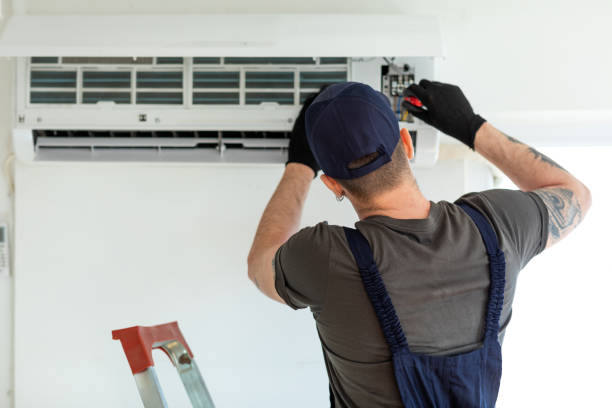Air conditioning units are essential for maintaining comfort in homes and commercial spaces, especially during the warmer months. However, just like any other mechanical system, air conditioners require regular maintenance to keep them running efficiently and prevent costly repairs or replacements. In this ultimate guide, we’ll cover what to expect from AC maintenance services, why it’s important, and how to ensure that your system continues to function at its best.
1. Why AC Maintenance is Important
Regular AC maintenance is essential for several reasons. Here’s why you shouldn’t skip these important service appointments:
-
Improved Efficiency: An air conditioner that is well-maintained operates more efficiently, which can lead to lower energy bills. A clean and well-tuned system doesn’t have to work as hard to cool your space, saving you money in the long run.
-
Prolonged Lifespan: Air conditioning units can last for years if properly maintained. Neglecting maintenance may cause the system to wear out more quickly, leading to premature replacements.
-
Better Air Quality: A well-maintained AC system helps to improve indoor air quality by preventing mold, bacteria, and allergens from circulating through the air. Regular cleaning of filters and other components ensures that your home or office has clean, fresh air.
-
Prevention of Breakdowns: Routine maintenance can identify small issues before they become bigger problems. This reduces the likelihood of unexpected breakdowns that may leave you without cooling during a hot day.
-
Increased Comfort: With regular maintenance, your AC system will cool your space more effectively, ensuring a comfortable environment.
2. What to Expect During an AC Maintenance Service
When you schedule an AC maintenance service, you can expect a detailed inspection and a series of checks to ensure that your unit is functioning correctly. Here’s a breakdown of what typically happens during an AC maintenance visit:
Inspection of the AC Unit
The technician will begin by inspecting the air conditioning unit, both inside and out. This helps to identify any visible signs of wear and tear or potential issues. Some areas they’ll focus on include:
- Air Handler: The technician will check the air handler to ensure that it’s functioning properly and that all parts are in good condition.
- Ductwork: The ducts will be checked for leaks, blockages, or signs of damage. Leaky ducts can lead to energy loss and reduced cooling efficiency.
- Refrigerant Levels: The technician will check the refrigerant levels in the system to make sure they are at the correct level. Low refrigerant levels can indicate a leak and can affect the performance of the unit.
- Condensation Drain: The drain that carries away excess moisture from the cooling process will be checked to ensure it’s not clogged or obstructed.
Cleaning and Replacing Filters
Air filters play a vital role in your AC’s efficiency. Over time, they can become clogged with dust, dirt, and debris, leading to poor air quality and reduced airflow. During maintenance, the technician will:
- Clean or Replace Filters: If the filters are reusable, they will be cleaned thoroughly. If they are disposable, they will be replaced with new ones to ensure that the system can circulate air efficiently and effectively.
Cleaning Coils
The evaporator and condenser coils are essential for the heat exchange process in an AC unit. Dirty coils can lead to reduced efficiency, as the system will have to work harder to cool the space. Maintenance includes:
- Cleaning the Evaporator Coil: The technician will inspect and clean the evaporator coil, which is responsible for absorbing heat from the air.
- Cleaning the Condenser Coil: The condenser coil releases heat outside your home. Cleaning the coil prevents debris from obstructing airflow and helps maintain optimal performance.
Checking the Refrigerant Level
Refrigerant is essential for the cooling process in air conditioning systems. If the refrigerant is low, it can cause the system to freeze or fail to cool properly. During maintenance, the technician will:
- Inspect Refrigerant Levels: They will check the refrigerant levels and top them off if necessary.
- Test for Leaks: If the refrigerant is low, it could indicate a leak. The technician will check for any signs of a refrigerant leak, which may require a repair to ensure that the system runs optimally.
Lubricating Moving Parts
AC units have many moving parts, such as the fan and motor. Over time, friction can cause these parts to wear out, leading to inefficiency or failure. During the maintenance visit, the technician will:
- Lubricate Motors and Fans: They will apply lubrication to motors and fans to reduce friction and prevent unnecessary wear and tear on the parts.
- Check Belt Tension: The technician will inspect and adjust the tension on belts, which could wear out or slip over time.
System Calibration
To ensure that the air conditioner is cooling your space effectively, the technician may perform a system calibration. This process includes:
- Thermostat Calibration: The technician will check your thermostat’s accuracy and adjust it if necessary, ensuring that the temperature settings match what the thermostat reads.
- Checking the Temperature Differential: This involves measuring the temperature difference between the air entering and exiting the air conditioner to make sure the system is cooling effectively.
Inspecting Insulation
Proper insulation helps your air conditioner maintain the desired temperature in your home or office. During maintenance, the technician will inspect:
- Insulation Around the Ducts: They will check the insulation around the ducts to ensure there are no gaps or damage that could lead to energy loss.
- Insulation on the AC Unit: The technician will also check the insulation on the air conditioner to prevent energy loss and improve overall efficiency.
3. How Often Should You Schedule AC Maintenance?
It’s recommended that you have professional AC maintenance at least once a year. Ideally, this should be done before the cooling season begins, usually in the spring. Regular maintenance before the summer heat sets in ensures that your air conditioner is prepared to handle the higher demand during the warmer months. Some systems, especially if they are older or used heavily, may benefit from bi-annual maintenance.
4. What Are the Benefits of Regular AC Maintenance?
By investing in regular AC maintenance, you can enjoy several benefits, including:
- Lower Energy Bills: A well-maintained air conditioner operates more efficiently, leading to reduced energy consumption and lower utility bills.
- Fewer Repairs: Routine maintenance helps catch small issues before they turn into costly repairs.
- Extended Equipment Life: Regular maintenance can extend the lifespan of your AC unit, saving you money in the long run by avoiding early replacement costs.
- Improved Comfort: With an efficiently running system, your AC will cool your space more evenly, providing consistent comfort throughout the year.
5. Choosing a Reliable AC Maintenance Service Provider
When selecting an AC maintenance service, it’s important to choose a reputable company with experience and knowledge of your specific air conditioning system. Look for a service provider that is licensed, insured, and has positive customer reviews. It’s also beneficial to choose a company that offers preventative maintenance plans, which can help ensure that your system gets the care it needs throughout the year.
Conclusion
Regular AC maintenance is crucial for ensuring the efficiency, longevity, and performance of your air conditioning system. With professional maintenance services, you can expect a thorough inspection, cleaning, and calibration of your system to keep it running smoothly. Investing in routine maintenance will save you money on repairs, extend the life of your system, and keep your space cool and comfortable year-round.


